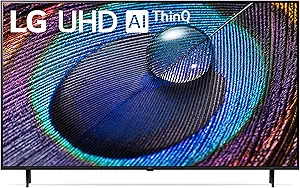In the world of television, LG and TCL have emerged as formidable competitors, each offering a range of models that cater to diverse consumer preferences. As technology advances, the features and specifications of these TVs continue to evolve, making it crucial for consumers to understand the differences between LG and TCL TVs before making a purchase decision.
Key Features Comparison
Picture Quality
Top-Rated Picture Quality Brands
TCL and LG television sets are esteemed for their exceptional visual performance, albeit employing distinct technologies to achieve their displays. TCL, particularly renowned for its 6-Series, harnesses Quantum Dot (QLED) technology, renowned for its vibrant color rendition and heightened luminosity levels. Paired with Dolby Vision HDR, this fusion delivers an immersive viewing experience, enriching detail in both shadowy and luminous sequences. Yet, some users have observed limitations in motion handling with TCL TVs, potentially affecting the visual fidelity during high-speed sequences.
Conversely, LG televisions leverage OLED technology, renowned for its ability to achieve perfect blacks and an infinite contrast ratio by individually powering off pixels. This characteristic yields a more authentic and lifelike visual output. Augmenting this prowess, LG integrates the Alpha 9 Gen 3 AI Processor 4K, utilizing deep learning algorithms to upscale lower resolution content, thereby further enhancing picture quality. Moreover, LG TVs support an extensive array of HDR formats, including Dolby Vision, HDR10, HLG, and Advanced HDR by Technicolor, ensuring superior color accuracy and contrast. However, LG OLED TVs often command a higher price point than TCL QLED TVs, and there exists a risk of burn-in with OLED displays, potentially impacting long-term visual integrity.
In essence, both TCL and LG excel in delivering superior visual performance, albeit through distinct technological avenues. Ultimately, the preference between the two may hinge on individual inclinations and budget considerations.
Design
When it comes to aesthetics, TCL and LG televisions each boast unique and contemporary designs that seamlessly complement any home environment. TCL's televisions are celebrated for their minimalist allure, characterized by slender bezels and a clean rear panel, with recent models such as the TCL 6-Series featuring a brushed metal finish for a touch of sophistication. Nonetheless, some users have observed that TCL's stands tend to be broader, potentially posing challenges for smaller TV stands or tables. Conversely, LG's televisions exude a sense of luxury, with OLED models showcasing an ultra-thin profile and near-borderless displays that heighten the viewing experience. Furthermore, LG's stands demonstrate versatility, with certain models featuring a distinctive crescent-shaped design that not only ensures stability but also adds a captivating visual element. However, LG's emphasis on high-end design often accompanies a higher price point, which may not suit every budget. Despite this, both TCL and LG offer compelling design options, with LG's innovative approach setting it apart as a frontrunner in the realm of television aesthetics.
Sound
Top-Rated Sound Quality Brands
Both TCL and LG stand as reputable contenders in the television market, each presenting distinctive sound technologies aimed at elevating the auditory journey for users. TCL integrates Dolby Atmos into its televisions, delivering an immersive three-dimensional audio experience that enriches the overall viewing ambiance. However, occasional inconsistencies in sound quality, particularly at higher volumes, may necessitate the use of external sound systems for optimal audio performance. Conversely, LG showcases AI Sound Pro technology, a cutting-edge innovation that analyzes and enhances audio content in real-time, ensuring a more immersive and lifelike sound encounter. Furthermore, select LG models feature built-in soundbars, enhancing the audio experience with superior quality. Despite LG's generally excellent sound output, it may sometimes lack the depth and richness provided by external sound systems. In comparison to TCL, LG televisions offer a more uniform sound quality across various volume levels, cementing their position as a frontrunner in auditory excellence.
Quality & Performance
TCL and LG stand as prominent figures in the television sector, each presenting a diverse array of models showcasing varying levels of quality and performance. TCL has gained recognition for its top-tier 4K and QLED TVs, particularly celebrated for their exceptional picture quality exemplified by technologies like Dolby Vision HDR, HDR10, and HLG, prominently featured in their 6-Series models. Nevertheless, TCL televisions face occasional criticism for their inconsistent brightness levels and subpar audio performance. Conversely, LG televisions are revered for their unmatched performance and excellence, notably in their OLED and NanoCell series. LG's OLED TVs, such as the CX and GX series, are esteemed for their unparalleled black levels, expansive viewing angles, and impeccable color accuracy, bolstered by cutting-edge technologies like Dolby Vision IQ, Dolby Atmos, and the ?9 Gen 3 AI Processor 4K. However, they come at a premium price point compared to TCL models and are susceptible to burn-in with static images. While both brands offer top-notch televisions, LG stands out for its superior performance and advanced features, albeit at a higher cost.
Smart TV & Connectivity
TCL and LG present smart TVs boasting advanced connectivity capabilities, yet diverge in their respective technological frameworks and user interfaces. TCL excels with its integration of Roku, delivering a straightforward interface facilitating seamless access to a plethora of streaming channels. While TCL TVs ensure stable internet connectivity through dual-band Wi-Fi and Ethernet, the platform lacks extensive customization options and some advanced features such as voice control. Conversely, LG's webOS platform garners acclaim for its intuitive design and vast app ecosystem, offering a user-friendly experience. LG TVs further enhance connectivity with features like Bluetooth Sound Out, enabling effortless pairing with external speakers or headphones. Additionally, LG incorporates AI ThinQ technology, empowering users with voice control functionalities through Google Assistant and Amazon Alexa integration. However, LG's premium offerings often come at a higher price point compared to TCL, a factor to consider for budget-conscious consumers.
Brand Reputation
TCL and LG stand as prominent players in the television sector, each boasting distinct attributes and drawbacks. TCL, a Chinese multinational electronics corporation, has surged in popularity owing to its blend of quality and affordability. Noteworthy is TCL's innovation in pioneering QLED and Mini-LED technologies, exemplified by the acclaimed 6-Series known for its exceptional picture quality and cost-effectiveness. Nonetheless, concerns regarding the durability of TCL TVs have been raised by some users, casting doubts on their longevity compared to competitors. In contrast, LG, a South Korean multinational electronics conglomerate, commands admiration for its premium televisions renowned for their superior performance and reliability. LG's OLED TVs, in particular, are hailed as industry leaders for their unrivaled picture quality and deep blacks. Additionally, LG's WebOS smart platform earns accolades for its user-friendly interface and vast app selection. However, LG's high-end offerings often come with a heftier price tag, posing accessibility challenges for certain consumers. Despite this, LG continues to garner high customer satisfaction ratings, indicating widespread acknowledgment of the elevated performance and durability of its products, justifying the premium price for many.
Brightness
TCL and LG stand as reputable contenders in the television realm, celebrated for their cutting-edge innovations and top-tier visual displays. When examining the brightness capabilities of TCL and LG televisions, discernible disparities emerge. TCL, particularly exemplified by its 6-Series, harnesses Quantum Dot (QLED) technology to deliver enhanced brightness levels and a broader color spectrum. This technological prowess ensures that brightness augmentation does not compromise picture quality, even in well-lit environments. Nonetheless, users have reported occasional instances of slight washout in darker scenes due to heightened brightness. Conversely, LG televisions, notably its OLED variants, shine with their impeccable black levels and boundless contrast ratios. While they may not reach the pinnacle of brightness achieved by TCL's QLED models, they excel in rendering a balanced and nuanced picture across diverse lighting conditions. LG's latest iterations integrate the Alpha 9 Gen 3 AI Processor 4K, employing advanced algorithms to autonomously fine-tune brightness and contrast in accordance with content and ambient lighting, ensuring an optimal viewing experience. However, LG's OLED offerings generally command a premium price compared to TCL's QLED models, a factor that prospective buyers may need to consider.
Smart Features
TCL and LG televisions offer an array of smart functionalities designed to enrich the user experience. TCL's TVs operate on the Roku TV platform, renowned for its user-friendly interface and extensive streaming service library. With support for voice control via Amazon Alexa and Google Assistant, users can effortlessly manage channels, adjust volume, and execute other commands using voice prompts. Despite generally positive feedback on TCL's smart features, some users have voiced concerns regarding the platform's speed and responsiveness. Conversely, LG employs its proprietary webOS platform, known for its intuitive design and seamless access to various streaming services like Netflix, Amazon Prime Video, and Hulu. LG's latest models integrate ThinQ AI technology, enabling voice control through Google Assistant and Amazon Alexa while serving as a central hub for smart home devices. Moreover, LG televisions support Apple's AirPlay 2 and HomeKit, distinguishing them from TCL models. However, LG's smart features may pose navigation challenges for some users compared to the straightforward interface of TCL's Roku platform.
Remote Control
TCL and LG televisions boast sophisticated remote control capabilities that elevate user interaction. TCL's remote is lauded for its straightforward design, featuring minimal buttons for ease of use, complemented by voice control functionality, particularly advantageous for individuals with limited mobility. However, its lack of backlighting poses challenges for navigating in dimly lit environments. Conversely, LG's Magic Remote garners praise for its innovative design resembling a computer mouse, enabling intuitive point-and-click navigation. Equipped with voice control and backlit buttons, LG's remote offers convenience, although some users have noted issues with sensitivity, resulting in rapid cursor movement. Despite differing strengths and weaknesses, both TCL and LG provide distinctive remote control features aimed at enhancing the user experience.
Related Video
Conclusion
Choosing between LG and TCL ultimately comes down to individual preferences, budget considerations, and the specific features that matter most to you. LG's OLED displays are a standout feature for those seeking top-tier picture quality, while TCL's QLED offerings provide a compelling alternative at a more affordable price. Before making a decision, it's advisable to compare specific models within each brand, considering factors such as screen size, resolution, smart TV features, and design. Whether you prioritize cutting-edge technology or value-conscious options, both LG and TCL have a wide range of TVs to cater to various consumer needs.



















